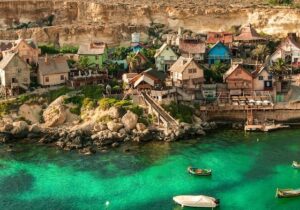The Malta Digital Nomad Visa has emerged as a well-rounded option for remote workers living a nomad lifestyle. Over the last four years, the pandemic has accelerated the popularity of remote working, which has led to an increase in the number of digital nomads.
Recognizing this sharp increase in the number of foreign remote workers and their economic impact on the countries they choose to work from, nations worldwide started offering digital nomad visa programs to formalize digital nomads’ status and attract foreigners into their economies. Malta’s reputation in the technology industry and forward-thinking policies around cryptocurrency have placed the Maltese Digital Nomad Visa ahead of many alternative digital nomad visa programs.
Malta Digital Nomad Visa: Brief Overview

The Malta Digital Nomad Visa provides temporary residency rights for up to one year in the island nation to non-EU, non-EEA, and non-Swiss individuals capable of working remotely with a fixed internet connection and whose current employment source is from a foreign company in a foreign country to Malta.
While the residency permit obtained with a Maltese Digital Nomad Visa is officially valid for up to one-year, non-EU nationals can renew their Malta Digital Nomad Visas and further enjoy the island life if they continue to meet the Maltese government’s requirements for the program.
The Residency Malta Agency oversees the Malta Digital Nomad Visa program, facilitating a seamless process for individuals to apply for a new nomad visa or renew an expiring one. The Malta residence permit may be renewed twice for a total stay of three years at the discretion of the Residency Malta Agency.
Benefits of the Malta Nomad Residence Permit
There are a handful of benefits to acquiring the Malta Nomad Residence Permit, including the ability to work in Malta without having to pay taxes twice. These benefits are namely:
primary language
EU and Schengen Zone
agreements
all year-round
- Malta has a large digital nomad community due to its good infrastructure and being at the forefront of tech and finance-related policies.
- English is one of Malta’s official languages.
- You can visit other Schengen countries without obtaining a Schengen visa.
- Living in Malta provides easy access to Europe, North Africa, and the Middle East.
- Malta is an island that is known for having very friendly citizens.
- Malta is an island in the Mediterranean Sea with beautiful beaches, many cafes, and bars where you can have a wonderful time.
- You can enjoy delicious seafood dishes and foreign cuisines.
- Malta has year-round beach weather with hot summers and mild winters.
- You won’t have to pay taxes twice on your income.
Requirements for the Malta Digital Nomad Visa
The eligibility requirements for a Malta Digital Nomad Visa application include the following:
- Show a minimum monthly income of €2,700 or €32,400 annually
- Be of a non-European Union, non-EEA, or non-Swiss nationality
- Be employed by a company registered in a foreign country; OR
- Be a recognized partner in an organization outside of Malta; OR
- Offer freelance or consulting services to entities whose permanent establishments are registered in a foreign country outside of Malta, demonstrating proof of an employment contract.
- Possess valid travel document
- Have a valid health insurance policy covering the entire stay in Malta, and show proof of a health declaration
- Have a legal rental agreement or purchase agreement for a property in Malta
- Undergo and pass a background verification check
Malta Nomad Residence Permit Application Process

- Fill out and sign the main applicant’s N1A application form and N1B. Both forms must be fully completed (typewritten and signed).
- Concerning family members and eligible dependents, Application Form N2 must be fully completed (typewritten and signed), as well as Application Form N4 (for each individual in the application) – fully completed (typewritten and signed).
- Submit your letter of intent explaining why you want to move to Malta and apply for the Digital Nomad Visa.
- Gather all the required documents mentioned below:
- A copy of all passport pages (including blank pages) for each applicant
- Proof of employment/business ownership
- Proof of your employment contract clearly showing obligations to the employer and describing work duties. Unless stated in the same contract, the applicant is to provide a cover letter and declaration from the employer that work may be performed remotely, independent of location, and official tax documentation confirming your relationship with your employer and verifying that you can perform your official duty remotely.
- If you are an entrepreneur, you must show self-employment documentary evidence, including a certificate of incorporation, memorandum, articles of association, share register, etc. You also need to provide bank statements of an account in your name clearly showing the income from self-employment for the previous three months as evidence of being able to satisfy the qualification criteria.
- In case of freelance, you need to submit service contracts clearly showing obligations to the service receiver, the work duties performed and rate of payment.
- Proof of monthly income
The main applicant must prove to have a guaranteed source of income, as per applicable thresholds of the Malta Digital Nomad Visa, for a minimum period of five months (cumulative) from the day of application. - Medical insurance
Health insurance policy and a health declaration stating that you will be responsible for covering any medical cost in Malta that the insurance company will not cover. - Accommodation
Proof of your property lease or purchase agreement in Malta. You can choose from various accommodation options available in Malta – hotels, hostels, vacation houses, resorts, and more. Temporary accommodation is a short-term place of stay of up to one month, which can be submitted upon issuance of the Letter of Approval in Principle. With one month of temporary accommodation, a Letter of Final Approval will be issued; however, upon arrival to Malta, you must opt to secure a one-year lease for a card to be issued. It is not acceptable to reside in a hostel. - Curriculum Vitae, disclosing full details of professional timeline and academic qualifications.
If you wish to include your spouse or partner, a copy of the marriage certificate or sufficient documents to prove the partnership will be required, such as utility bills, lease agreements, bank statements, etc.
The Malta Digital Nomad Visa processing time is generally around 30 days. Note that as part of the Nomad Residence Permit requirements, you will go through a background verification check by the Residency Malta Agency after you have submitted all the necessary documents.
Should the Residency Malta Agency approve your application, a Letter of Approval in Principle will be issued, and one is required to submit proof of accommodation and a health insurance policy within 30 days from the date of issuance of the Letter of Approval in Principle. Once the above is finalized, a Letter of Final Approval is issued. If an applicant requires an entry visa, they will be contacted by the Central Visa Unit at Identità (formerly known as Identity Malta Agency) to guide them through the process.
The applicant will also be notified by email if the application is rejected.
Once in Malta, the applicant must schedule an appointment to submit biometrics. The residence card takes between two to three weeks to be issued. Once issued, the applicant will be notified via email and requested to collect the card in person from Residency Malta’s offices, bringing the passport to the appointment.
Application Fee for the Malta Nomad Residence Permit
One of the main benefits of the Malta Digital Nomad Visa is that individuals can include their immediate family members in their applications. This means they can bring their spouse, young children, and any dependent adult children to Malta and enjoy the benefit of family reunification under the Malta Digital Nomad Visa scheme.
The Malta Digital Nomad Visa cost for the main applicant is €300. Individuals who wish to include their family members can do so by paying an additional €300 for each family member.
There is also a fee of €27.50 per person for issuing the residency card, which must be paid at Residency Malta’s offices. Payments can only be made by card. Cash payments are not accepted.
Malta Nomad Visa Tax Scheme
Malta Digital Nomad Visa holders can relocate, reside, and work remotely from Malta without having to pay tax on their worldwide income or be registered for tax residency in Malta.
Those working remotely in the island nation with an employer registered abroad are considered to have foreign-sourced income when they enter Malta, which means they are exempt from personal income tax. That being said, consumption tax will be levied on Nomad Residence Permit holders just like on Maltese citizens.
Malta Nomad Residence Permit – Important Terms and Conditions
Digital nomads who want to live and work from Malta for up to 180 days will be given a national visa, whereas individuals who want to relocate to Malta for a minimum of 365 days and above will be given a Nomad Residence Permit. The applicant must be a third-country national and submit their applications through the nearest local Malta Embassy or Consulate in their home country.
How Can Global Citizen Solutions Help You?
Global Citizen Solutions is a boutique migration consultancy firm with years of experience delivering bespoke residence and citizenship by investment solutions for international families. With offices worldwide and an experienced, hands-on team, we have helped hundreds of clients worldwide acquire citizenship, residence visas, or homes while diversifying their portfolios with robust investments.
We guide you from start to finish, taking you beyond your citizenship or residency by investment application.

Frequently Asked Questions about the Malta Digital Nomad Visa
Does Malta have a digital nomad visa?
The Malta Digital Nomad Visa is an official nomad visa program offered to third-country nationals (non-EU-EEA and non-Swiss) who work or do business remotely and wish to live in Malta.
What is a nomad visa?
A digital nomad visa is similar to a full-time work visa for foreign remote workers. It grants residency rights to foreign individuals who can work remotely from home or abroad and whose source of employment is foreign to the respective country.
Is Malta good for digital nomads?
Offering a cosmopolitan culture, incredible island life, pleasant climate, and unlimited adventure opportunities to state-of-the-art telecommunications technologies, widespread 5G coverage, and co-working spaces, Malta is the ideal location for digital nomads. Many digital nomads earning the required minimum gross yearly income of €32,400 live in Malta through the Maltese Digital Nomad Visa.
Maltese Digital Nomad Visa holders can travel to most countries in Europe, including all EU countries and the Schengen zone, without obtaining a Schengen visa.
How should one apply for a Digital Nomad Residence Permit?
Foreigners can submit an application online for nomad residence permits to nomad.residencymalta@gov.mt. The Malta Digital Nomad Visa requirements include submitting all the documents supporting your application, such as a bank statement proving earnings of the minimum required income, health insurance, and medical documents proving good health.
Can a Nomad Residence Permit holder offer their service to individuals or companies registered in Malta?
A Malta Nomad Residence Permit holder, including their dependents, cannot offer their services or be engaged in any economic activity with employers or companies registered in Malta.
Third-country nationals offering services to companies registered and based in Malta would need to renounce their Nomad Residence Permit and apply for a residence permit based on employment or self-employment in Malta.
The Residency Malta Agency reserves the right to revoke the Nomad Residence Permit should it become aware of such activity being undertaken by a holder.
Can I work remotely from Malta?
If you’re a third-country national, you can work remotely in Malta by applying for the Malta Digital Nomad Visa, which provides one year of residency with the right to renew your permit twice for a total of three years.
Is Malta's digital nomad visa tax-free?
There is no Malta Digital Nomad Visa tax. Malta maintains a territorial taxation system, meaning Maltese Digital Nomad Visa holders are excluded from paying taxes in Malta based on double tax agreements and maintaining earnings outside Malta.




